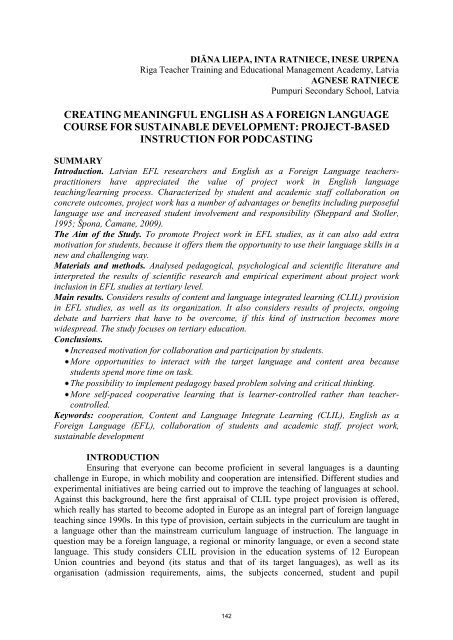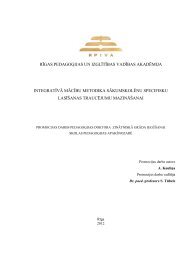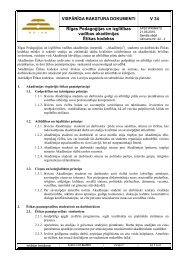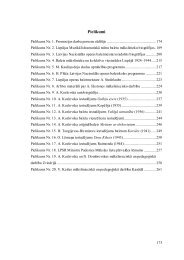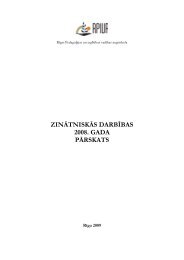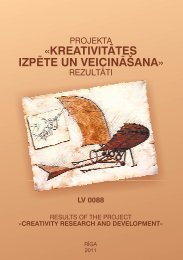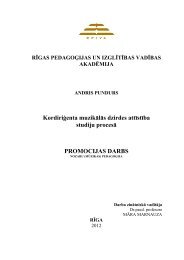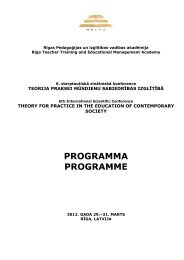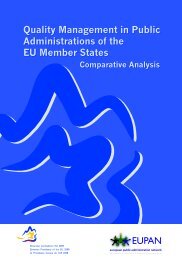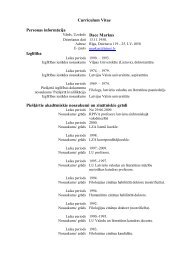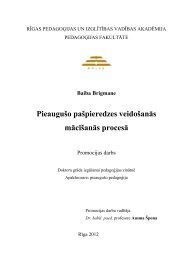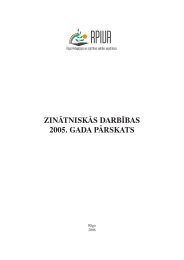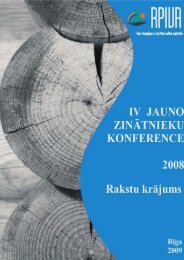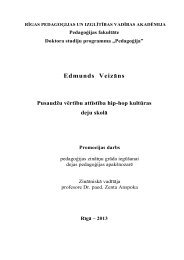saturs - rpiva
saturs - rpiva
saturs - rpiva
- No tags were found...
Create successful ePaper yourself
Turn your PDF publications into a flip-book with our unique Google optimized e-Paper software.
DIĀNA LIEPA, INTA RATNIECE, INESE URPENA<br />
Riga Teacher Training and Educational Management Academy, Latvia<br />
AGNESE RATNIECE<br />
Pumpuri Secondary School, Latvia<br />
CREATING MEANINGFUL ENGLISH AS A FOREIGN LANGUAGE<br />
COURSE FOR SUSTAINABLE DEVELOPMENT: PROJECT-BASED<br />
INSTRUCTION FOR PODCASTING<br />
SUMMARY<br />
Introduction. Latvian EFL researchers and English as a Foreign Language teacherspractitioners<br />
have appreciated the value of project work in English language<br />
teaching/learning process. Characterized by student and academic staff collaboration on<br />
concrete outcomes, project work has a number of advantages or benefits including purposeful<br />
language use and increased student involvement and responsibility (Sheppard and Stoller,<br />
1995; Špona, Čamane, 2009).<br />
The Aim of the Study. To promote Project work in EFL studies, as it can also add extra<br />
motivation for students, because it offers them the opportunity to use their language skills in a<br />
new and challenging way.<br />
Materials and methods. Analysed pedagogical, psychological and scientific literature and<br />
interpreted the results of scientific research and empirical experiment about project work<br />
inclusion in EFL studies at tertiary level.<br />
Main results. Considers results of content and language integrated learning (CLIL) provision<br />
in EFL studies, as well as its organization. It also considers results of projects, ongoing<br />
debate and barriers that have to be overcome, if this kind of instruction becomes more<br />
widespread. The study focuses on tertiary education.<br />
Conclusions.<br />
Increased motivation for collaboration and participation by students.<br />
More opportunities to interact with the target language and content area because<br />
students spend more time on task.<br />
The possibility to implement pedagogy based problem solving and critical thinking.<br />
More self-paced cooperative learning that is learner-controlled rather than teachercontrolled.<br />
Keywords: cooperation, Content and Language Integrate Learning (CLIL), English as a<br />
Foreign Language (EFL), collaboration of students and academic staff, project work,<br />
sustainable development<br />
INTRODUCTION<br />
Ensuring that everyone can become proficient in several languages is a daunting<br />
challenge in Europe, in which mobility and cooperation are intensified. Different studies and<br />
experimental initiatives are being carried out to improve the teaching of languages at school.<br />
Against this background, here the first appraisal of CLIL type project provision is offered,<br />
which really has started to become adopted in Europe as an integral part of foreign language<br />
teaching since 1990s. In this type of provision, certain subjects in the curriculum are taught in<br />
a language other than the mainstream curriculum language of instruction. The language in<br />
question may be a foreign language, a regional or minority language, or even a second state<br />
language. This study considers CLIL provision in the education systems of 12 European<br />
Union countries and beyond (its status and that of its target languages), as well as its<br />
organisation (admission requirements, aims, the subjects concerned, student and pupil<br />
142


